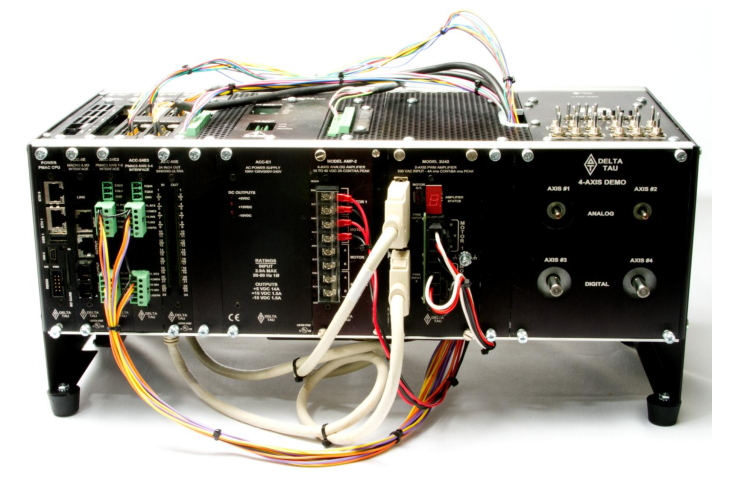Industrial Automation
Course Description
This course introduces the necessary math and tools for Industrial implementation of control and interfacing with mechatronics systems. Today's algorithms, to control machines, are coded onto digital platforms (like computers or microcontrollers) and this class will teach you the fundamentals of doing so. To better understand the theory and tools learned in lecture, all algorithms will be implemented on a real-time control hardware (controller) which every student will be required to purchase (along with other components). Discrete-time signal processing, sampling theory, continuous-time controller emulation in discrete-time, and understanding the limitations of implementing continuous-time controllers in discrete-time will be learned. Prerequisite of MCEN 4043 (System Dynamics) or equivalent.
Textbook (not required)
We will not have a required textbook this semester! All the material for this course will be covered during lectures completely or using handouts and online resources. But, if you are like me and would like a book for reference/addition resource than I would suggest the following (but there are many great books out there other than just these).
If you think you are interested in Continuous-Time Control than this is a good book (and it has a digital control chapter):
- Feedback control of Dyanmic Systems by Franklin
If you would like a book that is primarily a Digital Control book:
- Digial Control of Dynamic Systems by Franklin, Powell, and Workman.
If you are interested in signal processing and want to know more about digital/discrete (along with continous) time systems, this is one well respected:
- Signals and Systems by Oppenheim
Automation Hardware (Required)

Topics Covered
(not restricted to this order)
1.) Signal Processing
- Fourier-Series (FS)
- Continuious-Time Fourier Transform (CTFT)
- Discrete-Time Fourier Transform (DTFT)
- Samping Theory
- Modulation and Wireless Communication
2.) Systems and Control
- Short Review of Continuious-Time System Analysis
- Short Review of Continuious-Time Feedback Control
- The Z-Transform and the Difference Equation
- Convolution
- Discrete-Time System Representation
- Discrete-Time Controller Design
3.) Implementation
- Analog to Digital Converter
- Digital to Analog Converter
- Filter Realization
- Anti-aliasing Filter
- Choice of Sampling Rate
4.) Automation and Hardware
- Trajectory Generation
- Motors
- Amplifiers
- Sensors
- Communication
- Real-Time Operating System and Jitter
5.) Embedded Systems:
- Timers
- Interrupts
- Hardware Registers
- Peripherals
Grading Breakdown
- Individual Work (100%)
- Homework/Workshops (15%)
- Projects (60%)
- Final Exam (25%)
- TBA
- This will most likely include a hardware implementation portion of the exam
Office Hours
Dr. Ruben: Tu 4:30-5:30pm; Th 5:30-6:30pm (ECME 128)
Policies
Projects
- All Project Reports are required to be written in Latex.
Homework/Workshops
- Assignments must be neat, organized and legible. Typed assignments are welcome.
- Put a box around all final answers.
- Show your work enough to fully demonstrate your understating and your arrival at your answer.
Grading
- You only have TWO WEEKS to question grading from the time the homework\exam\project is returned.
- Specifically for exam grade questions, students must write up a detailed document (using Word or other word processing tool, not hand-written) describing the question and email that document along with your graded exam to Dr. Ruben.
- This will be the final grading scale used for the course. There is no curve. You are not competing against classmates, so help them out if you can! I reserve the right to lower the scale (i.e., make it easier), but I will not raise it.
- A: 90+
- A-:87-89
- B+:85-86
- B : 83-84
- B-:80-82
- C+:77-79
- C : 74-76
- C-:70-73
- D+:68-69
- D : 63-67
- D-:60-62
- F : 59 or below
In-Class Expectations
The following expectations will assist us with the creation of a learning community and a high quality of educational experience. The University of Colorado Classroom Behavior Policy will compliment these expectations:
- Use your cell phones for Clicker Reef but please refrain from using your cell phone for non- Sys D tasks so you can be present during the live lecture.
- No laptops during lectures (unless approved for taking notes or if we're in the middle of a pandemic)
Academic Integrity
You will be asked to complete group homework assignments in this course, but it is also expected that you will abide by The University of Colorado Honor Code at all times.
Late Work
No late work will be accepted

